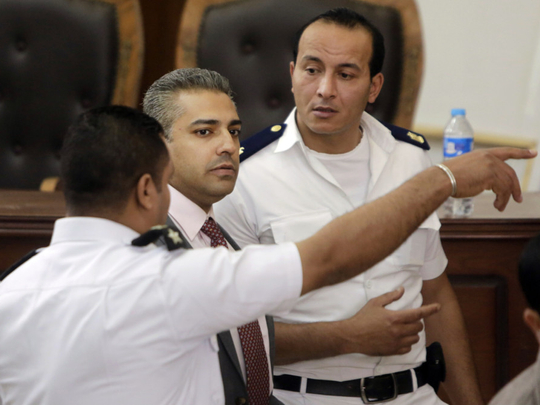
Cairo: Two Al Jazeera English journalists on trial in Egypt have celebrated a welcome turn in their long-running case when a committee investigating the evidence against them announced the pair had not fabricated news footage.
Canadian journalist Mohammad Fahmi and Egyptian producer Baher Mohammad were arrested in December 2013 and convicted of aiding a terrorist organisation and spreading “false news” after a trial denounced internationally as a farce.
An appeal judge also condemned the proceedings and ordered a retrial.
Following Tuesday’s announcement, Fahmi said: “It’s a victory because they straight out said there was no editing or fabrication of any sort in the videos that are so-called evidence against us. This is great for us. Me and Baher were giving each other high-fives in the cage when we heard this.”
After spending more than 400 days in prison, Fahmi and Mohammad were released on bail in February. A third Al Jazeera journalist who had been convicted alongside them, Peter Greste, was deported to Australia.
The committee tasked with sifting through the journalists’ videos told the court it had prepared a 280-page report regarding the material. The panel was appointed after a separate committee testified in February that they had not seen all the footage presented as evidence by prosecutors.
Fahmi said he believed the trial may now shift focus from the more serious charges of terrorism and fabricating news to allegations of technical violations, which would carry a lighter sentence.
“I believe and all the lawyers believe that he [the judge] may clear us of the terrorism charges and the fabrication charges, especially after today. And he may try to find us guilty of technical issues like the transmission licence, the broadcast licence, not being registered in the press centre.”
Fahmi blames his employers at Al Jazeera for exposing him, Mohammad and Greste to danger in Egypt. “If I knew, or any of the journalists knew that they had an issue with the licences, nobody would have continued working with them.”
In addition, he says the Qatar-based network used his news reports produced for Al Jazeera English and rebroadcast them, without his consent, on its Egyptian channel — Al Jazeera Mubasher Misr — which was banned in 2013 by court order.
“I am going after them,” he said. “You will find out very soon.”
Egyptian authorities accelerated arrests and prosecutions of journalists following the military’s removal of elected president Mohammad Mursi in July 2013. According to the Committee to Protect Journalists, at least nine journalists remain in prison.
Proceedings in the trial have been adjourned until May 9.












